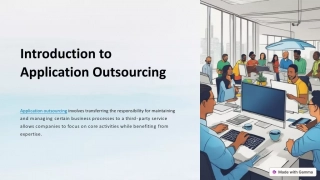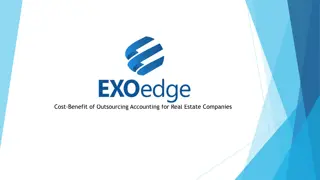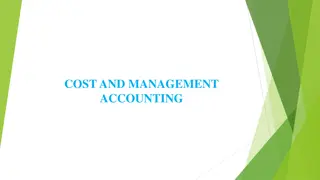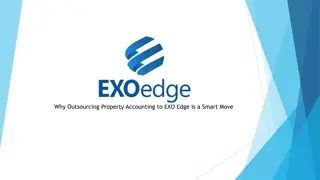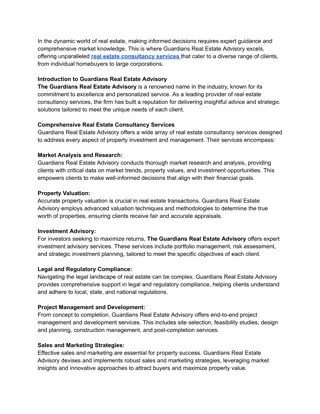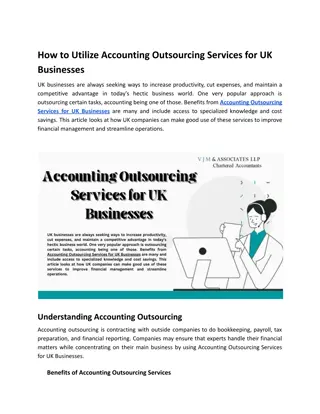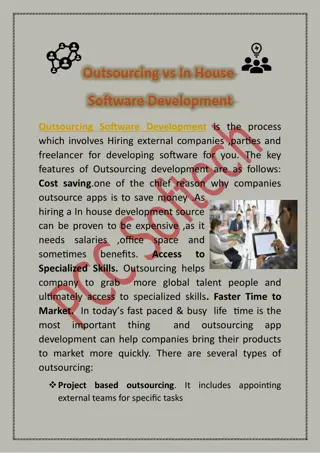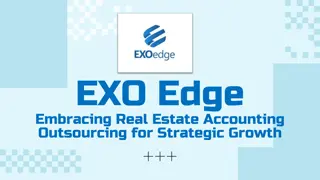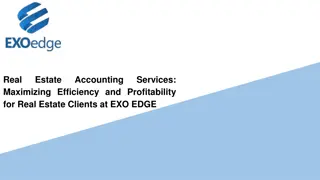Cost-Benefit of Outsourcing Accounting for Real Estate Companies
This PowerPoint presentation explores the critical decision of whether real estate companies should manage their accounting in-house or outsource it to external experts. It highlights the comprehensive cost analysis needed for informed decision-makin
Download Presentation

Please find below an Image/Link to download the presentation.
The content on the website is provided AS IS for your information and personal use only. It may not be sold, licensed, or shared on other websites without obtaining consent from the author. Download presentation by click this link. If you encounter any issues during the download, it is possible that the publisher has removed the file from their server.
E N D
Presentation Transcript
EXO Edge The Accounting Crossroads: In-House Expertise or Outsourced Efficiency in Real Estate? R e p o r t e r : Q i a n u . c o m
Introduction When deciding whether to retain financial management in-house or outsource it, real estate companies must consider cost efficiency, scalability, and risk management. In-house management entails significant fixed costs, such as salaries and training, while outsourcing can convert these into variable costs, potentially leading to savings. Outsourcing also offers scalable solutions, allowing companies to adjust services according to their needs without the high costs of expanding an in-house team. Additionally, external experts bring specialized knowledge and ensure compliance with regulatory standards, reducing the risk of costly penalties and providing an objective perspective on financial decision-making. These factors are crucial for making an informed decision that aligns with a company's financial goals and operational needs.
The Accounting Crossroads In-house accounting allows businesses to maintain Outsourcing accounting tasks provides access to a wider direct control over their financial operations. The range of expertise and advanced accounting expertise available, however, varies with the company s technologies with lower overhead costs. External resources. Larger companies can afford to hire providers specialize in financial management for the real specialists with high levels of expertise, while smaller estate sector, bringing extensive experience from organizations might struggle to attract and retain top multiple clients. This often results in more sophisticated talent, potentially limiting the depth of financial financial strategies and improved efficiency in handling knowledge. complex regulatory compliance issues.
A Cost Comparison of Outsourcing vs. In-House Management Understanding the cost implications of outsourcing versus in-house real estate accounting requires a detailed breakdown of both approaches. Each option carries its own financial considerations, including overt and hidden costs. Let s explore these in detail: Outsourcing Real Estate Accounting Service Fees: Outsourcing involves paying fees to an external firm. These fees can be fixed based on the volume of transactions, providing flexibility. Technology Costs: The outsourcing firm covers system costs but will likely utilize your software. Recruitment and Training Expenses: Significantly reduced, as the need to hire and train in-house staff is eliminated. Scalability: Costs can vary more predictably with business volume; you pay more when you need more services or more people to support your business. Hidden Savings: Includes savings on office space, equipment, and utility expenses, as well as insurance costs for an in-house team.
A Cost Comparison of Outsourcing vs. In-House Management Understanding the cost implications of outsourcing versus in-house real estate accounting requires a detailed breakdown of both approaches. Each option carries its own financial considerations, including overt and hidden costs. Let s explore these in detail: In-House Real Estate Accounting Salaries and Benefits: Ongoing expenses include salaries, benefits, and taxes for accounting staff. Technology and Infrastructure: Includes accounting software licenses, hardware, and IT support costs. Training and Development: Costs associated with keeping the team updated on accounting standards, software, and best practices. Office Space and Utilities: Additional overhead costs to accommodate the accounting team. Hidden Costs: Insurance expenses, paying for PTO, and the need for additional staff during peak periods can drive up to fully loaded costs considerably.
How Does Outsourcing Beat In-House in Real Estate Accounting? Outsourcing real estate accounting is a viable financial option for businesses, especially considering the comprehensive costs associated with in-house operations. Below are five key points that underscore the financial benefits of outsourcing: Reduced Labor Costs: Outsourcing cuts labor costs by eliminating expenses related to salaries, benefits, taxes, and other employee-related costs. Companies pay only for the specific services they need. Lower Infrastructure Costs: Maintaining an in-house team requires investment in office space, hardware, software, and IT support. Outsourcing firms cover these costs within their fees. Scalability: Outsourcing offers flexibility to scale services according to business volume without the need to hire or lay off staff. Expert Knowledge and Training Savings: Outsourced firms have up-to-date expertise in accounting practices, regulations, and technologies, saving businesses the costs and time of training in-house staff. Enhanced Controls and Compliance: Outsourcing firms often have strong controls, audits, and compliance measures in place, reducing the risk of financial errors or fraud.
Choosing the Right Outsourcing Partner? Choosing the right outsourcing partner for real estate accounting is a critical decision that can significantly impact a business s operational efficiency, financial integrity, and competitive edge. The ideal partner should bring expertise and efficiency to the table and align with the company s strategic goals, culture, and compliance requirements. This choice affects not just the cost-effectiveness of outsourcing but also the quality of financial reporting, compliance with regulations, and the ability to make informed business decisions.
EXO Edge A Closer Look EXO Edge is a leader for outsourcing support for the real estate industry, offering a compelling blend of expertise, technology, and customer-focused services. Their value proposition includes: Specialized Real Estate Accounting Services: EXO Edge provides a comprehensive suite of accounting services tailored to the real estate sector, including property accounting, bank reconciliations, lease file audits, construction accounting, and more. Technology-Driven Solutions: They leverage advanced technologies to deliver efficient and accurate accounting processes every time. Customizable Service Offerings: Understanding that every business has unique needs, EXO Edge offers flexible service options that can be customized to fit each client s specific requirements. Commitment to Security and Compliance: The company prioritizes the security of client data and adheres strictly to the highest global regulatory standards.
Advantages of Partnering with EXO Edge Businesses gain access to a team of accounting experts specialized in the real estate sector. Outsourcing with EXO Edge can lead to significant cost savings compared to maintaining a solely in- house team. By handling many of the accounting complexities, EXO Edge allows businesses to focus more on other core operational and growth opportunities. When your business is experiencing rapid portfolio growth, EXO Edge can tap into an enormous talent pool to support you as you scale.
Thank you R e p o r t e r : Q i a n u . c o m
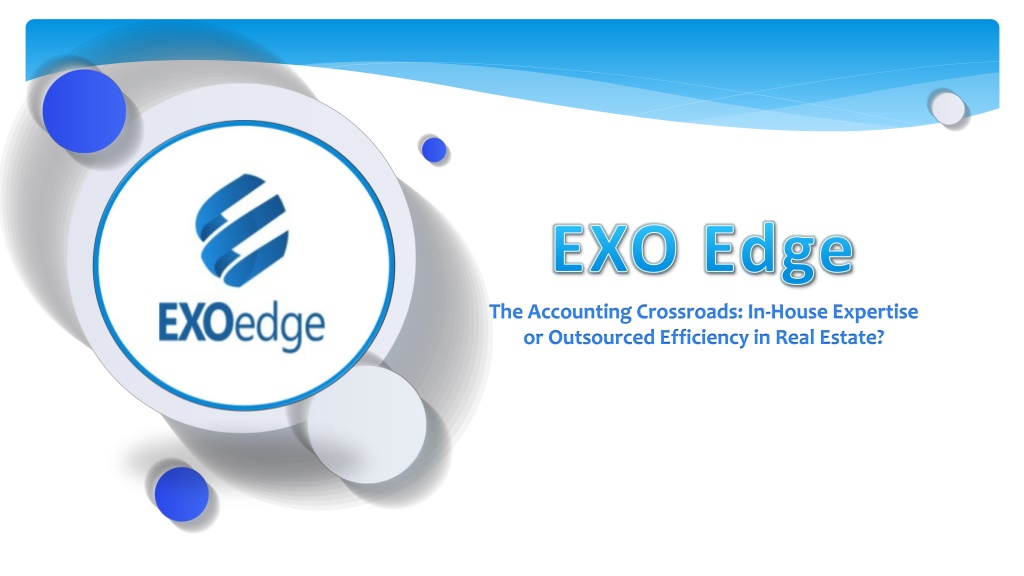
 undefined
undefined












